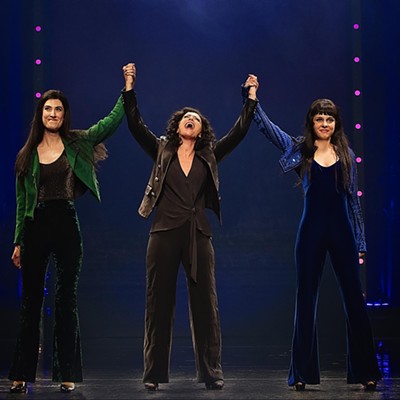The setup:
Belle Epoque French playwright Georges Feydeau single-handedly invented the sex comedy.
There were precursors – comedians Labiche (The Italian Straw Hat) and Hennequin (forgotten, like Labiche, but in his prime in the 1870s, feted and terribly successful) – but at the turn of the 20th century, Feydeau eclipsed them all because he knew how to write below the belt.
Constructed like the toniest of Swiss watches, his plots tick merrily away, specific and always on schedule, until he decides to over-wind them. On the verge of bursting springs, his characters whirl and spin dizzily out of control. Time has no meaning, because everything, everybody, has been reduced to the most basic, primal human desire – sex. It's the one quality that makes every social stratum bonkers.
The execution:
In theater comedy, there's nothing so sublime as Feydeau. Doors slam, characters are mistaken for somebody else, husbands seduce wives who might be disguised under veils, everyone's in love with somebody else, and marriage vows are written in disappearing ink. Animal instincts rule. Propriety be damned, it's the human carnival as witty three-ring circus. There's nothing so out of control, yet under such steely control, as Feydeau farce. His wild comedies, translated almost as soon as they premiered on the “Boulevard” (Paris's off-Broadway), influenced every subsequent playwright.
Theatre Southwest presents this rare 1892 mother of all Feydeau farces (last seen on Broadway in 1981) and does fairly well by it. If it's a bit too frantic and over-the-top at the start, it settles down considerably as it continues on its whirligig progress. The best part of Feydeau is seeing how he's going to resolve all the problems he creates in the first scene. That distinctive Feydeau tone is immediate.
Too much arch is anathema. Overplay, and the Frenchman's patented wit dissolves. Underplay, and his wit falls flat. Director Ananka Kohnitz, responsible for TSW's incandescent Bug and The Beauty Queen of Leenane a few seasons ago, treads a wise middle ground. There's a lot of frenzy at the start, too much really, and a lot of faux tony accents and plenty of action that doesn't suit the characters. Would demure wife Leonine, a proper turn-of-the-century bourgeois housewife, faced with evidence that her husband has been philandering, really stomp on the hat of pseudo lover Moricet with such unabashed abandon? Probably not. This is Feydeau, not a cartoon, no matter how two-dimensional his characters might seem. But, thankfully, the playwright's precise watch starts ticking again, and Kohnitz pulls everything back on track.
As a lover who never gets to love but desperately wants a fling with his best friend's wife, Christopher C. Conway, as horny Moricet, plays him on the cusp of RuPaul's Drag Race. It's a bizarre interpretation, the polar opposite of what you might expect from some legendary Parisian amour, but it works, surprisingly so. He never fails to amaze, get a laugh or say a line with an utterly distinctive flair. First it seems all wrong, then it seems so absolutely right, we wonder why everybody else isn't following his lead. This is theater sleight of hand of very subversive quality. He bowls us over, even though we're not sure why or how.
After the first scene, once she's over the heebie-jeebies, Renata Santoro Smith, as wronged wife Leontine, settles easily into Feydeau's sprightly antics. Wearing Amber Stepanik and Kohnitz's lush costumes – silk bustles and furbelows for days; wigs made out of whipped cream – she becomes a resistant, if pliant, Feydeau foil. Brian Heaton, as fop nephew Jean Pierre, should be tethered to the ground, since he's likely to float away; while Julie Oliver, as randy landlady Madame Spritzer, anchors the play with earthy delight.
The handsome set, designed by John Stevens and Kohnitz, is a Dairy Queen swirl of Art Nouveau, rich in black and blood red. There are stripes on stripes, enough fleurs-de-lis to make Louis XIV weep, and a lovely sense of place.
The verdict:
In Kenneth MacGowan and William Melnitz's classic textbook, The Living Stage, playwright Georges Feydeau is not mentioned. Contemporaries Ibsen, Strindberg and Chekhov, of course, are given pride of place, but a comedy writer, no way. And yet, Feydeau's work is as enduring and influential as the angry Norwegian, the dour Swede and the nostalgic Russian. Making an audience laugh at their silly everyday lives is just as important as making them realize the dank futility of their silly everyday lives. Writing comedy may or may not be the harder task, but laughter is, as Reader's Digest always celebrated, the best medicine. The doctor is definitely in at Theatre Southwest.
13 Rue de L'Amour continues through June 18 at Theatre Southwest, 8944-A Clarkcrest. For more information, call 713-661-9505 or visit theatresouthwest.org. $16-$18.
Support Us
Houston's independent source of
local news and culture
account
- Welcome,
Insider - Login
- My Account
- My Newsletters
- Contribute
- Contact Us
- Sign out
13 Rue de L'Amour: Theatre Southwest Presents the Mother of All Feydeau Farces
D. L. Groover June 9, 2016 7:00AM
[
{
"name": "Related Stories / Support Us Combo",
"component": "11591218",
"insertPoint": "4",
"requiredCountToDisplay": "4"
},{
"name": "Air - Billboard - Inline Content",
"component": "11591214",
"insertPoint": "2/3",
"requiredCountToDisplay": "7"
},{
"name": "R1 - Beta - Mobile Only",
"component": "12287027",
"insertPoint": "8",
"requiredCountToDisplay": "8"
},{
"name": "Air - MediumRectangle - Inline Content - Mobile Display Size 2",
"component": "11591215",
"insertPoint": "12",
"requiredCountToDisplay": "12"
},{
"name": "Air - MediumRectangle - Inline Content - Mobile Display Size 2",
"component": "11591215",
"insertPoint": "4th",
"startingPoint": "16",
"requiredCountToDisplay": "12"
}
,{
"name": "RevContent - In Article",
"component": "12527128",
"insertPoint": "3/5",
"requiredCountToDisplay": "5"
}
]
KEEP THE HOUSTON PRESS FREE...
Since we started the Houston Press, it has been defined as the free, independent voice of Houston, and we'd like to keep it that way. With local media under siege, it's more important than ever for us to rally support behind funding our local journalism. You can help by participating in our "I Support" program, allowing us to keep offering readers access to our incisive coverage of local news, food and culture with no paywalls.
D.L. Groover has contributed to countless reputable publications including the Houston Press since 2003. His theater criticism has earned him a national award from the Association of Alternative Newsmedia (AAN) as well as three statewide Lone Star Press Awards for the same. He's co-author of the irreverent appreciation, Skeletons from the Opera Closet (St. Martin's Press), now in its fourth printing.
Contact:
D. L. Groover
Trending Arts & Culture
- Reviews For The Easily Distracted:
Abigail - Houston Bookstore Crawl Celebrates Small Businesses and Literary Diversity
- The Story Stalls But The Beat Goes On in The Cher Show at TUTS
-
Sponsored Content From: [%sponsoredBy%]
[%title%]

Don't Miss Out
SIGN UP for the latest
arts & culture
news, free stuff and more!
Become a member to support the independent voice of Houston
and help keep the future of the Houston Press FREE
Use of this website constitutes acceptance of our
terms of use,
our cookies policy, and our
privacy policy
The Houston Press may earn a portion of sales from products & services purchased through links on our site from our
affiliate partners.
©2024
Houston Press, LP. All rights reserved.





